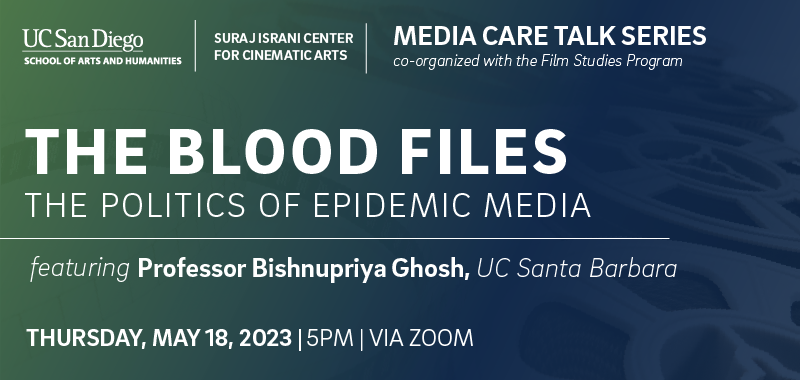May 18, 2023–May 18, 2023 from 5:00pm–6:30pm
The Blood Files: The Politics of Epidemic Media w/ Prof. Bishnupriya Ghosh

Speaker: Bishnupriya Ghosh, professor, UC Santa Barbara
Respondent: Lisa Cartwright, professor, Departments of Visual Arts and Communication, UC San Diego
Hosted by Wentao Ma, Ph.D. Student, Department of Literature, UC San Diego
This event will be held via Zoom Webinar -- registrants will receive the Zoom link prior to the event start time.
Abstract
Epidemic media can range from spanking new care affordances (like test-kits or self-check devices) to sophisticated aggregative technologies (disease surveillance networks like FluNet) and pioneering medical platforms (diagnostic and prognostic). Drawing on "The Virus Touch: Theorizing Epidemic Media" (forthcoming Duke UP, 2023), Ghosh argues that high epistemic value of "new," "smart," or "sophisticated" media habitually bypasses the significance of low-tech media crucial for the regulation and control of acute infection. Often located at clinical points of care, these media appear as mundane commodities circulating within global biomedical infrastructures; there seems nothing creative or innovative about them. Focusing on "patient files" as a case in point, Ghosh theorizes the ordinary "media care" of chronic infection at two HIV/AIDS health centers—the Site B clinic Khayelitsha (Cape Town) and Sanjeevani at Humsafar Trust (Mumbai). Following Cornelia Vismann (2008), Ghosh argues that files accumulative tendency readies these technologies for tracking infection beyond clinical confines. Files attune caregivers to the "interior milieu" of an individual patient but they are baggy enough to open into the greater disease milieu. As such, these are smart epidemic media that eschew an anthropocentric approach for a multispecies politics of health.
Biography
Bishnupriya Ghosh is faculty in the English and Global Studies departments at UC Santa Barbara. She has published two monographs, "When Borne Across: Literary Cosmopolitics in the Contemporary Indian Novel" (Rutgers UP, 2004) and "Global Icons: Apertures to the Popular" (Duke UP, 2011) on global media cultures. Her current work on media, risk, and globalization includes the co-edited "Routledge Companion to Media and Risk" (Routledge 2020) and a new monograph, "The Virus Touch: Theorizing Epidemic Media" (forthcoming from Duke University Press, May 2023). She is starting research on media environments of viral infection in a book of essays tentatively entitled, "Epidemic Intensities."
About the Media Care Talk Series
Dozing at the movie theater, listening to the podcast on the subway, counseling via Zoom appointments, searching immigration policy on the internet…In this increasingly crumbling world, media offer maintenance and sustain our vitality while they also harm our well-being through abuse and addiction. This talk series examines the concept of care and showcases the process of knowledge production surrounding artificial care in media practice. We will browse a range of media objects and platforms - from cinema to teletherapy, from smart drugs to sleep apps - and explore the habitual, affective, and material potential of healing and solidarity within film and media theories.
This series is co-organized by the Film Studies Program and the Suraj Israni Center for Cinematic Arts at UC San Diego with generous support from the following: 21 Century China Center, Department of Communication, Department of Visual Arts, Department of Literature, and the Institute of Arts & Humanities.
Questions
Email surajisranicenter@ucsd.edu.
By registering for this event you agree to receive future correspondence from the Suraj Israni Center for Cinematic Arts, from which you can unsubscribe at any time.
Date and Time
May 18, 2023–May 18, 2023
from 5:00pm–6:30pm
Location
Zoom
Event Registration
Registration for this event is required.
Visit the registration page for details.
Event Fee
Free
Contact
Reanna Sweis • rsweis@ucsd.edu
Audience
Faculty, Staff, Students, The General Public
Event Host
Suraj Israni Center for Cinematic Arts